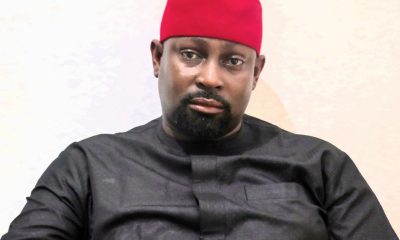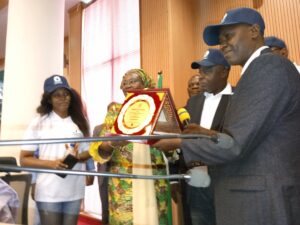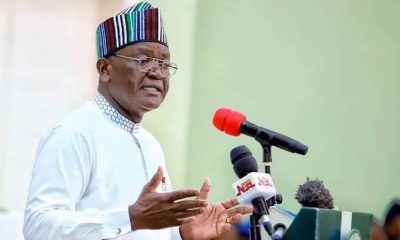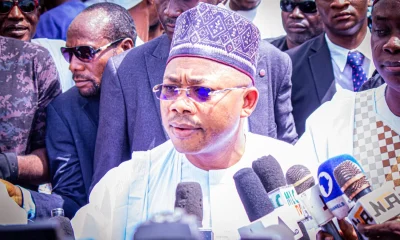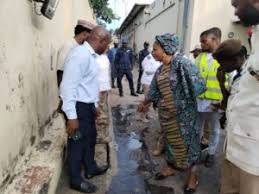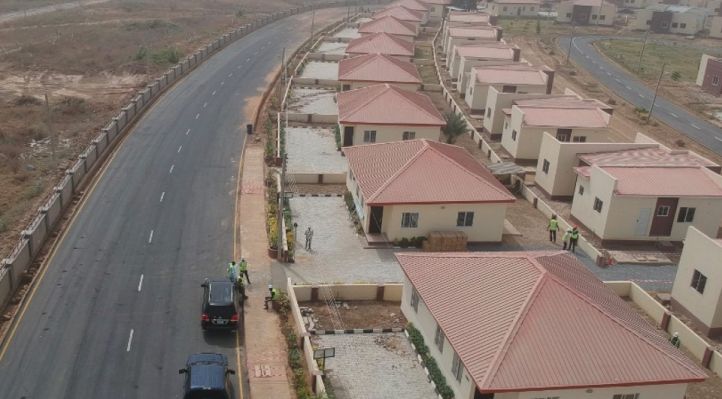NEWS
Buhari Names Chief of Staff, SGF Coordinators of Govt Functionaries
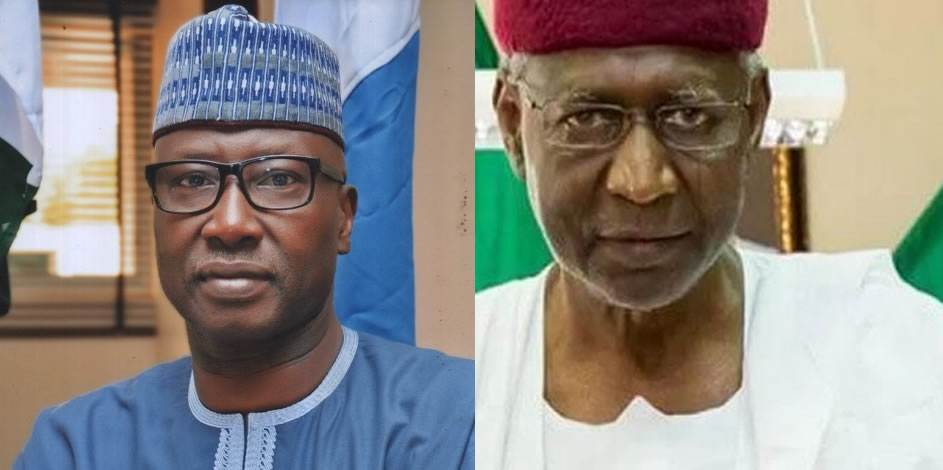
By Mathew Dadiya, Abuja
President Muhammadu Buhari Tuesday, announced that his Chief of Staff, Abba Kyari and the Secretary to the Government of the Federation, Boss Mustapha would from now coordinate some of his executive functions as he directed the ministers-designate to at any given time meet either of the duo depending on the issue at stake.
The President announced the new order to his new cabinet members at the end of the two-day presidential retreat for ministers designate and other top government functionaries at the Presidential Villa, Abuja.
President Buhari said, “In terms of coordination, kindly ensure that all submissions for my attention or meeting requests be channeled through the Chief of Staff, while all Federal Executive Council matters be coordinated through the Secretary to the Government of the Federation”.
While outlining some of the challenges before the administration in the next four years, Buhari wondered if the timeframe would be enough to deliver on the fresh mandate.
He noted that majority of Nigerians “are poor and are anxiously hoping for a better life” – one in which they do not have to worry about what they will eat, where they will live or if they can afford to pay for their children’s education or healthcare.
The President also tasked the Ministers designate expected to be sworn-in on Wednesday (today) that their responsibility as leaders of “this great country” was to meet these basic needs for our people.
Speaking further, President Buhari lamented the rot his administration inherited from the previous government under the opposition, emphasizing that this administration inherited many challenges.
“A country in which 18 local governments in the Northeast were under the control of Boko Haram; decayed infrastructure in which our rail lines and roads had severely deteriorated;
“A rent seeking economy that depended largely on oil revenues and imports, significant unpaid pensions, subsidy debts, legacy contractor debts. I can go on and on,” Buhari narrated.
He scored his administration high boasting that despite those challenges, his government has “largely succeeded in laying the foundation to rebuild our country.”
He said, “We recaptured those 18 Local Governments previously held by Boko Haram, whose activities are now limited to sporadic attacks against soft targets. Our investments in road and rail infrastructure are without precedent, and many of you can attest to this.
“We also focused on diversifying the economy from oil towards agriculture and industrialization. Despite reduced revenues from oil and gas compared to past governments, we have broadly addressed many of the legacy debts they left behind.
“Whilst we have obvious successes to celebrate, the challenges ahead are significant as you would have observed in detail over these two days. Nevertheless, from the quality of the deliberations, it is clear that solutions to our problems are well researched and have been well articulated.
“We have discussed solutions relating to addressing Insecurity; Macroeconomic Stability; Agriculture and Food Security; Energy Security for Petroleum products and Electricity; Transportation and Critical Infrastructure; Industrialization and SME Development; Human Capital Development; Social Inclusion; Anti-Corruption; Housing Financing and Consumer Credit.
“Public service is not easy work, and at times it can be thankless. I am therefore charging you all to see this opportunity to serve as an honour, to give your best to deliver on this mandate, for a more prosperous Nigeria, not for some, but for all Nigerians.
“You will find that working collaboratively and purposefully will enable us to achieve quicker results, recognizing that four years is not a very long time. For the new Ministers, make sure you engage and benefit from the experience of the older Ministers and former Governors in the cabinet”
Earlier, the Secretary to the Government of the Federation, Mustapha who is expected to coordinate the activities of most of the cabinet members and measure their outputs, said they are to consolidate and accelerate on the agricultural agenda to achieve full food sufficiency Increase revenue, implement measures to reduce leakages and drive cost optimisation.
The administration will also ensure effective coordination between monetary and fiscal policy, invest in human capital development with strong focus on early education and health insurance.
The second term administration will also facilitate investment in oil and gas sector by ensuring speedy passage of the Petroleum Industry Bill and Deep Offshore Oil and Exploration & Production Bill includes resolving the liquidity challenge in power sector and facilitate private sector investment.
“It was emphasized that we need to work effectively with all other arms of government such as state government, national assembly for major high impact initiatives such as provision of large scale land for agriculture and food security, passage of critical legislations.
“The work we have done here has been critical to laying the foundation for what we will accomplish in this administration. But this work alone is not why we are here. Now it is time to turn our words into actions – to take everything that we have learned, all the strategies and approaches that we have discussed, and go execute our priorities.
“This work begins now. The people of Nigeria are looking to this administration for results – and they expect them quickly. I will like to reiterate that the Federal Government is committed to delivering on and implementing all agreed initiatives within the stipulated timelines.
“To ensure effective implementation, the initiatives will be cascaded to the relevant ministries, whose ministers will champion the responsibility for driving implementation and execution.
“As ministers, you have leading roles in framing issues within your policy domain and developing, implementing and tracking policies and in communicating the impacts and results. It is your responsibility to take ownership over the success of these initiatives.
NEWS
LG polls: IPAC Warns Electorates against Violence in C’River
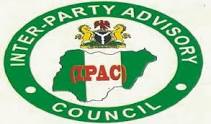
From Ene Asuquo, Calabar
With just one week to cross river local government election, the leadership of Inter-party Advisory Council IPAC has warned residents of the state against engaging in elections rigging, political violence, thuggery and acts that are inimical to the development of the State.
The stated chairman of IPAC Effiom Edet gave the warning during the flag -off of sensitization campaign rally against election rigging, thuggery and political violence in the forthcoming Nov.
2, local government polls in Cross River.The chairman stated that no country succeeds in choosing their right leaders in an election that is marred by violence and irregularities.
“Election is not a do or die affair, local government council elections which are to be conducted by November cannot be a so or die affair.
“We are taking this sensitization and campaign against violence and thuggery across the three Senatorial districts of the state to educate our people on the subject matter.
“We are here to educate the people on the consequences of engaging in rigging and political violence. Once you rig, you deprive the people of the opportunity of choosing the right people to lead.
“We are asking residents of the state to come out en masse to cast their vote on candidates of their choices for the local government elections.
“This is why we decided to flag off this sensitization exercise to let our people know that Electorates should not feel intimidated on that day but to come out and vote for candidates of their choices. Candidates whom they know will attract development to the grass root,” IPAC chair maintained.
NEWS
Youths Flee Nsu Community over Police Arrest in Imo

From Marcel Duru, Charity Wins Owerri
Over 1000 Youths resident in Nsu Cmmimity, Eheme Mbano Local Government Area of Imo State have vacated the area over mass arrest by the Nigeria Police Force.
Speaking with journalists at Douglas Road Owerri, Imo State yesterday, one of the victims, Jude Ezeala said that the arrest was in respect of the burning of Open University located at Nsu Community in Eheme Mbano LGA of Imo State.
He stated that he relocated to Owerri when Army and Police went to the market known as Oriagu market and arrested some youths which include motorcycle operators, Palm Fruit harvesters and took them to Imo Police Headquarters in Owerri, Imo State and labelled them suspects.
In the same vein a Medical Practitioner based in the area Dr. Frank Madu has stated that over 5000 people residing in communities more especially youths have vacated the area and relocated to different towns outside the State for fear of being killed as Unknown Gun Men by the Nigerian Army deployed in the area by the Federal Government in conjunction with the Governor of Imo State senator Hope Uzodimma.
He said that the relocation started gradually when Security Operatives headed by fierce Military men killed suspected UGM during a down raid on the Nsu Community Eheme Mbano Local Government Area of Imo State.
He revealed that the presence of heavily armed military were scaring people in the communities, adding that what made the residents change their mind completely was the recent deployment of over 1000 Soldiers driving in a motorcade accompanied by Police with several armored carriers.
He conclude that tension has pervaded as military were deployed and patrol in every nooks and crannies harassing humiliating and killing innocent people and branded them arsonists
It could be recalled that the Commissioner of Police Imo State Command has issued a press release to journalists telling them that the Command has arrested eight suspected arsonists.
NEWS
SEC Urges Stakeholders to Align with FATF

By Tony Obiechina, Abuja
The Director General of the Securities and Exchange Commission (SEC), Dr. Emomotimi Agama has stressed the need for stakeholders to adapt regulatory frameworks to align with the evolving Financial Action Task Force (FATF) standards.
According to him, failure to do so would not only jeopardize the integrity of the capital markets, but also pose a risk to Nigeria and the global financial system.
He stated this at the Compliance Summit 2024 organised by the Nigerian Capital Market Institute, a subsidiary of the SEC, with the theme: Navigating Regulatory Challenges: Aligning with Changes in FATF Standards in the Era of Virtual Asset Service Providers held in Lagos, Monday.
FATF guidance helps countries implement effective regulations, addressing risks associated with virtual assets.
Agama said as virtual assets continue to gain prominence, navigating regulatory challenges in the space requires proactive engagement with FATF standards adding that collaboration between regulators, VASPs and stakeholders ensures effective implementation.
Agama said the event is a testament to the collective commitment by stakeholders to ensuring that the Nigerian capital market remains at the vanguard of global financial integrity and efficiency, while fostering an environment conducive to progress and innovation.
He disclosed that the rapid evolution of virtual assets and the emergence of the related service providers have brought considerable changes to the financial landscape, creating opportunities and, invariably, carrying with it untold regulatory challenges that necessitate our immediate and appropriate attention.
He said, “During this summit, we will explore critical topics such as the unique regulatory implications posed by virtual assets service providers, the importance of compliance in safeguarding our markets, and strategies for implementing effective risk management protocols.
“We will be graced with presentations and discussions on these issues from leading experts and professionals, who will share their insights and experiences on industry best practice and regulatory developments”.
The SEC DG said the Summit serves as a platform for all stakeholders—regulators, operators, financial institutions, and technology innovators—to collaborate, share knowledge and chart the way forward as may be collectively desirable adding that all must therefore harness the strength of collective expertise to navigate the regulatory challenges ahead.
He said some recent changes in FATF standards significantly impact virtual asset service providers and these key updates include: Expanded VASP definition: Custodial wallet providers, exchanges and peer-to-peer platforms are now recognized as VASPs, Travel Rule: VASPs must share customer information during transactions, enhancing transparency, Licensing and registration: VASPs must register and obtain licenses, ensuring accountability and Enhanced AML/CFT measures: Strengthened regulations combat money laundering and terrorist financing.

